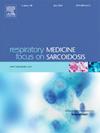The patient perspective on the environmental impact of inhalers
IF 3.5
3区 医学
Q2 CARDIAC & CARDIOVASCULAR SYSTEMS
引用次数: 0
Abstract
Introduction
Increasing the proportion of low-carbon inhalers prescribed within the NHS forms a central part of net-zero policy. Yet, the patients’ perspective on this strategy has not been determined. We aimed to establish if environmental issues are important to respiratory patients and whether this may influence inhaler choice.
Methods
We conducted a survey of 61 respiratory patients at the Royal Free NHS Foundation Trust, London to establish their perspective on the environmental impact of inhalers.
Results
We identified that 70.5 % (43/61) of patients did not know that inhalers could contribute to climate change. Furthermore, 85.3 % (52/61) of patients felt it was ‘quite’ or ‘very important’ to reduce their own contribution to climate change. Importantly, 59 % (36/61) of patients would actively want to change inhalers and 26.2 % (16/61) would consider changing inhalers based on this information. There was no significant difference based on age (< or ≥ 60 years) (Chi2 = 1.2, p = 0.28) or gender (Chi2 = 0.88, p = 0.77).
Discussion
These findings demonstrate that environmental issues are important to respiratory patients. Despite this, the environmental impact of inhalers is not routinely discussed with patients. Once provided with this information patients actively want to change to low-carbon inhalers. Hence, the environmental impact of inhalers should be shared with patients to help us to achieve a net-zero NHS.
从患者角度看吸入器对环境的影响。
导言:提高国家医疗服务体系(NHS)处方中低碳吸入器的比例是净零政策的核心部分。然而,患者对这一策略的看法尚未确定。我们旨在确定环境问题对呼吸系统患者是否重要,以及这是否会影响吸入器的选择:方法:我们对伦敦皇家自由 NHS 基金会信托基金会的 61 名呼吸系统患者进行了调查,以确定他们对吸入器环境影响的看法:结果:我们发现 70.5%(43/61)的患者不知道吸入器会导致气候变化。此外,85.3%(52/61)的患者认为减少自身对气候变化的影响 "相当重要 "或 "非常重要"。重要的是,59%(36/61)的患者会主动更换吸入器,26.2%(16/61)的患者会根据这些信息考虑更换吸入器。年龄(小于或大于 60 岁)(Chi2 =1.2,p=0.28)或性别(Chi2 =0.88,p=0.77)没有明显差异:这些研究结果表明,环境问题对呼吸系统患者非常重要。尽管如此,人们并未经常与患者讨论吸入器对环境的影响。一旦获得这方面的信息,患者就会积极希望改用低碳吸入器。因此,应与患者分享吸入器对环境的影响,以帮助我们实现净零污染的国家医疗服务体系。
本文章由计算机程序翻译,如有差异,请以英文原文为准。
求助全文
约1分钟内获得全文
求助全文
来源期刊

Respiratory medicine
医学-呼吸系统
CiteScore
7.50
自引率
0.00%
发文量
199
审稿时长
38 days
期刊介绍:
Respiratory Medicine is an internationally-renowned journal devoted to the rapid publication of clinically-relevant respiratory medicine research. It combines cutting-edge original research with state-of-the-art reviews dealing with all aspects of respiratory diseases and therapeutic interventions. Topics include adult and paediatric medicine, epidemiology, immunology and cell biology, physiology, occupational disorders, and the role of allergens and pollutants.
Respiratory Medicine is increasingly the journal of choice for publication of phased trial work, commenting on effectiveness, dosage and methods of action.
 求助内容:
求助内容: 应助结果提醒方式:
应助结果提醒方式:


